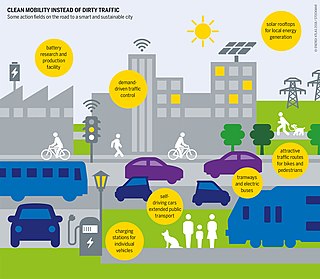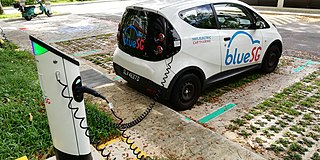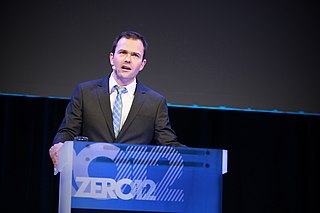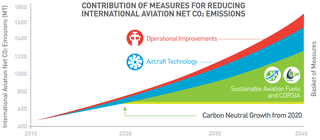
Biofuel is a fuel that is produced over a short time span from biomass, rather than by the very slow natural processes involved in the formation of fossil fuels such as oil. Biofuel can be produced from plants or from agricultural, domestic or industrial biowaste. Biofuels are mostly used for transportation, but can also be used for heating and electricity. Biofuels are regarded as a renewable energy source. The use of biofuel has been subject to criticism regarding the "food vs fuel" debate, varied assessments of their sustainability, and possible deforestation and biodiversity loss as a result of biofuel production.

Greenwashing, also called green sheen, is a form of advertising or marketing spin in which green PR and green marketing are deceptively used to persuade the public that an organization's products, aims, and policies are environmentally friendly. Companies that intentionally take up greenwashing communication strategies often do so to distance themselves from their environmental lapses or those of their suppliers.

Alternative fuels, also known as non-conventional and advanced fuels, are fuels derived from sources other than petroleum. Alternative fuels include gaseous fossil fuels like propane, natural gas, methane, and ammonia; biofuels like biodiesel, bioalcohol, and refuse-derived fuel; and other renewable fuels like hydrogen and electricity.

Emission standards are the legal requirements governing air pollutants released into the atmosphere. Emission standards set quantitative limits on the permissible amount of specific air pollutants that may be released from specific sources over specific timeframes. They are generally designed to achieve air quality standards and to protect human life. Different regions and countries have different standards for vehicle emissions.

Sustainable transport refers to ways of transportation that are sustainable in terms of their social and environmental impacts. Components for evaluating sustainability include the particular vehicles used for road, water or air transport; the source of energy; and the infrastructure used to accommodate the transport. Transport operations and logistics as well as transit-oriented development are also involved in evaluation. Transportation sustainability is largely being measured by transportation system effectiveness and efficiency as well as the environmental and climate impacts of the system. Transport systems have significant impacts on the environment, accounting for between 20% and 25% of world energy consumption and carbon dioxide emissions. The majority of the emissions, almost 97%, came from direct burning of fossil fuels. In 2019, about 95% of the fuel came from fossil sources. The main source of greenhouse gas emissions in the European Union is transportation. In 2019 it contributes to about 31% of global emissions and 24% of emissions in the EU. In addition, up to the COVID-19 pandemic, emissions have only increased in this one sector. Greenhouse gas emissions from transport are increasing at a faster rate than any other energy using sector. Road transport is also a major contributor to local air pollution and smog.

A green vehicle, clean vehicle, eco-friendly vehicle or environmentally friendly vehicle is a road motor vehicle that produces less harmful impacts to the environment than comparable conventional internal combustion engine vehicles running on gasoline or diesel, or one that uses certain alternative fuels. Presently, in some countries the term is used for any vehicle complying or surpassing the more stringent European emission standards, or California's zero-emissions vehicle standards, or the low-carbon fuel standards enacted in several countries.

The European emission standards are vehicle emission standards for pollution from the use of new land surface vehicles sold in the European Union and European Economic Area member states and the United Kingdom, and ships in EU waters. The standards are defined in a series of European Union directives staging the progressive introduction of increasingly stringent standards.

Clean technology, in short cleantech or climatetech, is any process, product, or service that reduces negative environmental impacts through significant energy efficiency improvements, the sustainable use of resources, or environmental protection activities. Clean technology includes a broad range of technology related to recycling, renewable energy, information technology, green transportation, electric motors, green chemistry, lighting, grey water, and more. Environmental finance is a method by which new clean technology projects can obtain financing through the generation of carbon credits. A project that is developed with concern for climate change mitigation is also known as a carbon project.
Neste MY Renewable Diesel is a vegetable oil refining fuel production process commercialized by the Finnish oil and refining company Neste. Whether as an admixture or in its pure form, Neste MY Renewable Diesel is able to supplement or partially replace diesel fuel without problems. Neste MY Renewable Diesel guarantees that every gallon sold meets ASTM D975 and EN 15940 specifications in compliance with OEM standards.

Aircraft engines produce gases, noise, and particulates from fossil fuel combustion, raising environmental concerns over their global effects and their effects on local air quality. Jet airliners contribute to climate change by emitting carbon dioxide, the best understood greenhouse gas, and, with less scientific understanding, nitrogen oxides, contrails and particulates. Their radiative forcing is estimated at 1.3–1.4 that of CO2 alone, excluding induced cirrus cloud with a very low level of scientific understanding. In 2018, global commercial operations generated 2.4% of all CO2 emissions.

Zero Emission Resource Organisation or ZERO is a Norwegian environmental organisation that was founded in 2002 to work on the reduction of greenhouse gases, primarily in Norway. The philosophy of the organisation is that if new facilities are made emission-free, then when existing plants and methods are phased out due to old age, society is left with emission-free facilities. The primary working areas include CO2 disposal, renewable energy, especially wind power, and new transportation fuels, including hydrogen and biofuel. ZERO is organised as foundation and was started by former activists and employees of Natur og Ungdom and Bellona. Funding sources include industrial associations and companies. ZERO is led by Marius Holm (director) and Erik Espeset (chairman).

Biofuels are renewable fuels that are produced by living organisms (biomass). Biofuels can be solid, gaseous or liquid, which comes in two forms: ethanol and biodiesel and often replace fossil fuels. Many countries now use biofuels as energy sources, including Sweden. Sweden has one of the highest usages of biofuel in all of Europe, at 32%, primarily due to the widespread commitment to E85, bioheating and bioelectricity.

An aviation biofuel is a biofuel used to power aircraft and is a sustainable aviation fuel (SAF). The International Air Transport Association (IATA) considers it a key element in reducing the environmental impact of aviation. Aviation biofuel is used to decarbonize medium and long-haul air travel. These types of travel generate the most emissions, and could extend the life of older aircraft types by lowering their carbon footprint. Synthetic paraffinic kerosene (SPK) refers to any non-petroleum-based fuel designed to replace kerosene jet fuel, which is often, but not always, made from biomass.

A low-carbon fuel standard (LCFS) is an emissions trading rule designed to reduce the average carbon intensity of transportation fuels in a given jurisdiction, as compared to conventional petroleum fuels, such as gasoline and diesel. The most common methods for reducing transportation carbon emissions are supplying electricity to electric vehicles, supplying hydrogen fuel to fuel cell vehicles and blending biofuels, such as ethanol, biodiesel, renewable diesel, and renewable natural gas into fossil fuels. The main purpose of a low-carbon fuel standard is to decrease carbon dioxide emissions associated with vehicles powered by various types of internal combustion engines while also considering the entire life cycle, in order to reduce the carbon footprint of transportation.

The indirect land use change impacts of biofuels, also known as ILUC or iLUC, relates to the unintended consequence of releasing more carbon emissions due to land-use changes around the world induced by the expansion of croplands for ethanol or biodiesel production in response to the increased global demand for biofuels.

The environmental effects of transport are significant because transport is a major user of energy, and burns most of the world's petroleum. This creates air pollution, including nitrous oxides and particulates, and is a significant contributor to global warming through emission of carbon dioxide. Within the transport sector, road transport is the largest contributor to global warming.

Individual action on climate change can include personal choices in many areas, such as diet, travel, household energy use, consumption of goods and services, and family size. Individuals can also engage in local and political advocacy around issues of climate change. People who wish to reduce their carbon footprint, can take "high-impact" actions, such as avoiding frequent flying and petrol fuelled cars, eating mainly a plant-based diet, having fewer children, using clothes and electrical products for longer, and electrifying homes. Avoiding meat and dairy foods has been called "the single biggest way" an individual can reduce their environmental impact. Excessive consumption is more to blame for climate change than population increase. High consumption lifestyles have a greater environmental impact, with the richest 10% of people emitting about half the total lifestyle emissions.

Energy in Sweden describes energy and electricity production, consumption and import in Sweden. Electricity sector in Sweden is the main article of electricity in Sweden. The Swedish climate bill of February 2017 aims to make Sweden carbon neutral by 2045. The Swedish target is to decline emission of climate gases 63% from 1990 to 2030 and international transportation excluding foreign flights 70%. By 2014 just over half of the country's total final energy consumption in electricity, heating and cooling and transport combined was provided by renewables, the highest share amongst the then 28 EU member countries. About a third of Sweden's electricity is generated by nuclear power. In generating a year's worth of this energy, Swedes generate about 4 tonnes of CO2 emissions each. Since 2010, sustainability measures have reduced total emissions even as the population has increased.

Climate change has resulted in an increase in temperature of 2.3 °C (2022) in Europe compared to pre-industrial levels. Europe is the fastest warming continent in the world. Europe's climate is getting warmer due to anthropogenic activity. According to international climate experts, global temperature rise should not exceed 2 °C to prevent the most dangerous consequences of climate change; without reduction in greenhouse gas emissions, this could happen before 2050. Climate change has implications for all regions of Europe, with the extent and nature of impacts varying across the continent.

The Carbon Offsetting and Reduction Scheme for International Aviation (CORSIA) is a carbon offset and carbon reduction scheme to lower CO2 emissions for international flights, to curb the aviation impact on climate change.



















